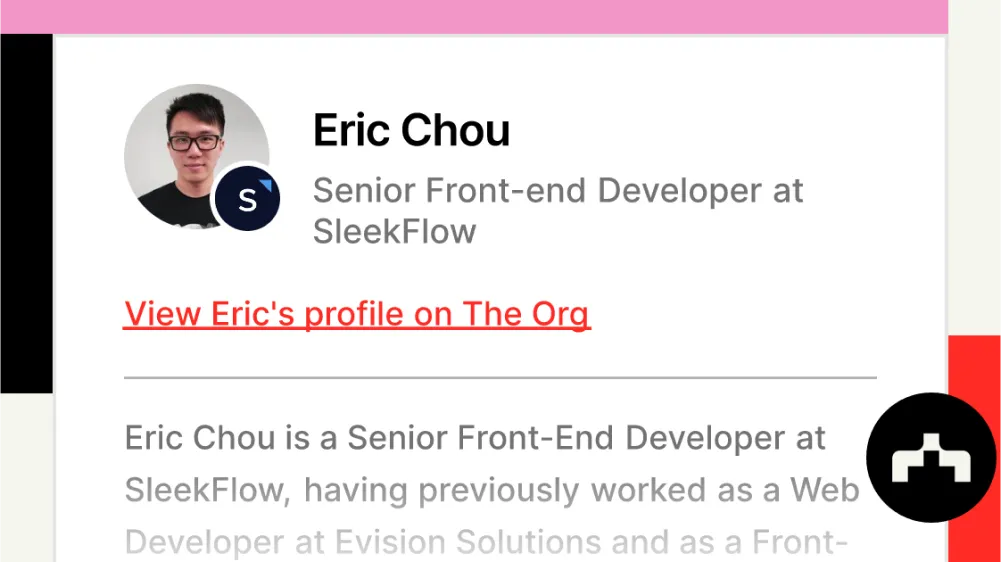Guide to Transitioning into a Senior Front-End Developer Role

Content Map
More chaptersWhat does it take to be a senior front end developer? Do you find yourself stuck in limbo, unsure if you can call yourself one? Worry no more, as this article will provide a step-by-step explanation of a senior frontend developer’s responsibility profile, the difference between senior and middle developers, and how you can quickly advance in your frontend career.
Key Takeaways:
- A senior front-end developer is an experienced professional responsible for designing, developing, and maintaining user interfaces (UIs) in web applications.
- In addition to coding, the main responsibilities of senior frontend developers include documenting, creating new functions and features, and optimizing the website user interface.
- To level up from middle to senior front-end developer, one needs to go beyond writing code by refining soft skills and solidifying technical knowledge.
What Does a Senior Front-End Developer Profile Look Like?

A senior front-end developer typically has 5 to 8 years of experience under their belt. As years of experience are often the easy part to identify for senior developers, their responsibilities might differ slightly from organization to organization.
The general definition of a senior front-end developer is a software engineer who works on building the user interface (UI) in an application. The user interface refers to all the interaction points between the digital interface and the end user. This broad definition encompasses 6 main responsibilities of a senior front-end developer.
Documentation
Front-end development documentation serves multiple purposes. More than a comprehensive collection of information and guidelines, it’s a source of clarity accompanying a software project codebase. The documentation ensures that all the relevant stakeholders are on the same page and facilitates effective communication and collaboration. Additionally, new developers joining the team have a document to anchor and get up to speed with the rest of the team members.
As this task requires juggling multiple requirements and constant communication, it requires the experience of a senior software engineer.
Creation of New Features
Numerous factors make a great senior frontend developer. It is the proficiency of numerous technical skills, including HTML, CSS, JavaScript, version control, responsive design thinking, and more. The combination of all these skills, along with the frontend developer’s own experience and intuition are used to create new features for an application. All of these tasks are performed from a user-centered design approach.
They will add new features intentionally to solve problems and enhance user experience rather than simply following a trend or because they feel pressured to do so.
Building Prototypes
A senior front-end engineer knows and understands the importance of a front-end prototype and, more importantly, can create a simulation of the final design. Senior developers know the principle of “show, don’t tell” by heart, and a prototype is how they display their knowledge. They know when to simplify certain steps without compromising code quality.
Writing Reusable Codes
The ability to reuse code in multiple contexts with little to no modification allows developers to be more focused on developing new features. Without the need to reinvent every single line of code along the way, code reusability keeps the software clean and modular and makes maintenance easy. Additionally, this minimizes the possibility of introducing bugs to the application development environment.
Still, over-resuing code can have adverse effects, and developers need to have a clear idea of the scope of the code reusability. All in all, these skills often don’t come easy and require in-depth knowledge and expertise from a senior developer.
Maintenance and Optimization
In addition to documenting and creating new features and prototypes, senior front-end developers need to constantly maintain and optimize the application’s user interface features. This includes updating the app with the latest trends and styles to enhance users’ experiences and setting maintenance schedules for the app to ensure it doesn’t lag and remains responsive.
Debugging
A senior frontend engineer can address the root cause before every debugging process, rather than looking at a surface problem. They are also able to propose a plan to fix the bugs using suitable tools (e.g. code editor with code debugging features) and follow a structured debugging approach.
Senior Frontend Developer Vs. Mid-Level Front End Developer

In the IT landscape, the line between middle and senior level frontend developers can be blurry. There are multiple reasons behind this possible confusion, including unclear requirements, a shortage in the IT industry, and clients’ expectations to work with the top IT talents. Therefore, it is understandable that developers themselves sometimes are unsure of which level they are at. There are, however, some clear distinctions between the senior and middle levels.
| Senior Front-End Developer | Middle Front-End Developer | |
|---|---|---|
| Years of Experience | 5 to 8+ years | 2 to 5 years |
| Technical Skills | Mastery of multiple technologies and frameworks | Proficient in multiple programming languages and technologies |
| Profile | Firm understanding of fundamentals | Excellent track record |
| Soft Skills | - Advanced communication skills - Problem-solving - Critical thinking | - Strong communication - Negotiation skills - Strategic leadership |
| Key Responsibilities | - Guide projects from start to end - Mentor junior and middle developers - Drive innovations | - Contribute to project architecture and design - Ensure software quality |
| Interaction with Clients | Understand client demands and engage in effective conversation | Start to embrace business insights |
| Decision-making Power | Make decisions and take responsibility | Ability to make decisions but prefer to consult senior developers |
Senior Front-end Developer Salary

The average salary of senior developers depends on the region they live in, experience, industry, company size, and living costs. Below is an average salary estimation for senior software engineers in different countries.
United States
- Average: $110,500 per year
- Range: $62,000 - $150,000+ per year
Germany
- Average: €65,000 per year (approximately $70,000 USD)
- Range: €55,000 - €80,000 per year (approximately $60,000 - $87,000 USD)
India
- Average: ₹1,000,000 per year (approximately $12,200 USD)
- Range: ₹410,000 - ₹2,000,000 per year (approximately $5,000 - $24,400 USD)
Singapore
- Average: S$100,000 per year (approximately $75,000 USD)
- Range: S$70,000 - S$150,000 per year (approximately $52,000 - $112,000 USD)
China
- Average: ¥300,000 per year (approximately $43,000 USD)
- Range: ¥200,000 - ¥500,000 per year (approximately $29,000 - $72,000 USD)
Do keep in mind that these numbers tend to fluctuate depending on the various factors we mentioned earlier. It is best to talk directly to your recruitment company or developers working in the senior position.
How to Level Up from Mid-Level to Senior Front-End Developer

We often discuss what skill a developer needs to acquire. However, it seems that we don’t talk enough about the reasons behind them. Having a basic grasp of the essential technical skills is great, but as a senior, you’re guiding other team members and need to influence them to make suitable technical decisions.
In this section, we would like to discuss practical specificity and how you can advance in your front-end career ladder.
Prerequisites
Let’s refresh our minds a bit. Make sure you already have a solid understanding of frontend tools and software. This entails JavaScript fundamentals, TypeScript, and knowledge of your chosen frontend framework before moving on to the next steps.
Skills for Senior Front-End Developers
- Module Federation: Gaining expertise in module federation is essential, especially when working with Micro Frontends.
- Code Quality: Learn to set up linting tools like ESLint and Prettier from scratch and incorporate them into your deployment pipeline using tools like Husky. They allow you to maintain coding standards automatically.
- Mental Models: Begin with a Mental Model before implementation. For instance, grasp the Virtual DOM pattern used by frameworks such as React and Vue.
- Virtual DOM: Understand why the Virtual DOM is used and how it enhances performance through concepts like the Diffing Algorithm and the Reconciliation process.
- Browser APIs and Routing: Familiarize yourself with the History API and routing to efficiently debug issues like blank pages.
- Accessibility: Master the basics of WCAG and Semantic HTML, especially if working in regulated sectors like government or public institutions.
- Focus on mastering CORS and HTTPS. Memorize common HTTP status codes for debugging and understand modern authentication techniques based on OAuth2.
- CDNs: Know how to set up a CDN and understand its role in enhancing performance.
- CI/CD: Learn to establish a deployment pipeline on platforms like AWS and understand scaling with services like CloudFront. Familiarity with Docker and Infrastructure as Code is beneficial.
- Micro Frontends: Understand the workings of Micro Frontends and the technical challenges such as managing CSS conflicts, integrating smaller applications, and sharing data between them.
- Monorepos and Design Systems: Understand the structure and deployment of Monorepos. Know the NPM package lifecycle and the importance of semantic versioning.
- Server-Side Rendering (SSR): Comprehend the benefits and challenges of SSR, including pre-rendering HTML on the server and dealing with technical hurdles.
- Backend for Frontend (BFF): Learn to extend API Endpoints or GraphQL Resolvers, understand authentication in machine-to-machine communication, and basic API design patterns. This knowledge can lead to full-stack engineering roles.
- Web Performance: Gain a solid understanding of server optimization techniques like HTTP caching and using CDNs. Familiarize yourself with image, font, CSS, and JavaScript optimization techniques.
Interview Questions a Senior Software Engineer Should Be Able to Answer

Future interviews for the senior frontend developer position will undoubtedly entail several more challenging questions. Here is a list of the top 5 questions you should be able to answer as a senior developer, with suggestions on how to answer them.
1. Based on the scale of the project, how can you choose between using Vue, React, or Angular?
The final decision often hinges on project requirements and your long-term goals. However, there are general rules that apply.
- Vue.js is preferable for both small and large projects as it is known for being flexible, simple and easy to adopt, Vue.js is suitable for small to medium-sized projects.
- React.js, with its robust ecosystem, is a great choice for complex projects.
- Angular: When it comes to comprehensive framework and enterprise-scale application development, Angular is an ideal choice of framework.
2. Why does responsive web design matter?
Responsive web designs ensure a consistent user experience across various viewports. In other words, the website isn’t only accessible but also looks great on desktop, tablet, and mobile devices.
3. How would you handle a slow-loading API request in your application?
Common techniques to optimize API performance include loading spinners, caching data, and optimizing API backend endpoints.
4. How do you optimize website performance?
There are several techniques to optimize performance, including using CDNs, optimizing images, lazy-loading content, minifying assets, bundling and code-splitting, and leveraging browser caching.
5. What steps do you take to address frontend security issues like CSRF and XSS attacks?
To prevent XSS, you need to sanitize input and use CSP headers. For CSRF, employ tokens, set SameSite cookies, validate Referer headers, and use double-submit cookies.
Orient Software: The Best Place to Find Skilled Senior Front-End Developers
Being a senior front-end developer has more to do than just an arbitrary number of experience. It is a clear shift from simply adding new functions to system-level architecture. It is the shift in mindset – your first reaction will be “What is the best solution to this problem?” rather than “Who should I report this problem to?”. It is the ability to decide which approach might work best for the team and the existing resources. It is the ability to not only lead the team but also mentor junior and middle roles.
All of these qualities, along with a deep understanding of core coding knowledge, are what make a skilled senior frontend developer.
Orient Software speaks from experience, as we have such high-quality experts on board. Online documents are great, but imagine getting valuable insights from seasoned software engineers to bring your project to the next level! If this sounds like something you want and need, secure the best senior software engineers with Orient Software by contacting us today!







